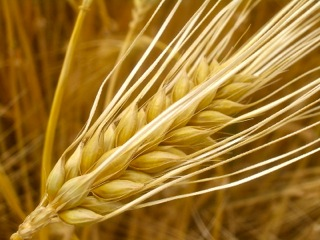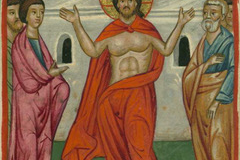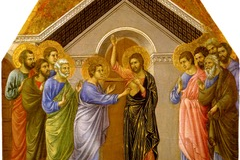Sunday Reflection with Fr Robin Gibbons - 18 March 2018

Fifth Sunday in Lent Amen, amen, I say to you, unless a grain of wheat falls to the ground and dies, it remains just a grain of wheat; but if it dies, it produces much fruit. Whoever loves his life* loses it, and whoever hates his life in this world will preserve it for eternal life. (Jn 12: 24,25)
It's a natural impulse to preserve life at all costs, to hold on to what we know and love as long as we can. This doesn't only apply to our human relationships, those of us with pets and other animals can understand the bond that builds up between living creatures and we can rejoice in the good this produces, whilst sorrowing at the damage and destruction that loss, sickness, willful injury and death inflicts on us all.
This can also apply to that wider love of nature, earth and cosmos, that 'expansive heart' many of us discover in our own lives. Yet if we truly love others, are open to the planet and all that it contains, we also know that we cannot preserve the changing moments of life except as memories. The nature of time, the ever-present cycle of life and season reminds us we cannot stand still. We have also to let go in order to move on, to open our hand so that something greater may take hold of us.
This is a hard truth to learn but it comes upon us as we grow up and discover we have to let go of so much in life. It takes time for the sentiments expressed in this anonymous saying to really root themselves in our psyche: 'I shall pass through this world but once. Any good, therefore, that I can do or any kindness I can show to any human being, let me do it now. Let me not defer or neglect it, for I shall not pass this way again'. Whilst some people may find this maudlin, all that is being expressed is a deeper truth, that in order to live and truly grow, we have to die a little. The grain cannot remain preserved as a single specimen, no matter how beautiful or interesting it might be, otherwise it does nothing. It needs to germinate in the dark earth, to die in the depths, in order to produce a new fruit.
Can we link our own experience to this image? Of course we can, each of us knows a bit of dying in our lives, it might be the personal loss of people or pets that are close to us. It may be our more expansive love of creation and life that moves us to tears when we see the fractures and cracks of life in those thousand small events that reveal the pain present with us, but that is not the end of the story, compassion and tears link us to the unending merciful tears of God, the tears of compassionate unending love, we learn through death to glimpse another life!
For the Christ of the journey, the Christ of the cross, reminds us time and time again we must embrace death too, and in our daily life learn to accept the small deaths to selfishness and sin demanded of us. For as the Easter hymns and songs always remind us, to lose life is also to gain it, nothing in the end is lost. We have three enduring gifts that take us beyond death and point to the reunion of all in God. 'Faith' in the God of the promises, 'Hope' in the resurrection of all in Christ and 'Love' the everlasting gift of the Spirit .
As we approach Great and Holy Week perhaps we can take courage from a 20th century martyr's last words as he went to death:' "This is the end. For me the beginning of life." (Dietrich Bonhoeffer. April 1945. Flossenberg Camp) And all in the end is harvest! Amen
Lectio Divina
"One who is content with what he has, and who accepts the fact that he inevitably misses very much in life, is far better off than one who has much more but who worries about all he may be missing . . . the relative perfection which we must attain to in this life if we are to live as sons of God is not the twenty-four-hour-a-day production of perfect acts of virtue, but a life from which practically all the obstacles to God's love have been removed or overcome. One of the chief obstacles to this perfection of selfless charity is the selfish anxiety to get the most out of everything, to be a brilliant success in our own eyes and in the eyes of other men. We can only get rid of this anxiety by being content to miss something in almost everything we do. We cannot master everything, taste everything, understand everything, drain every experience to its last dregs. But if we have the courage to let almost everything else go, we will probably be able to retain the one thing necessary for us- whatever it may be. If we are too eager to have everything, we will almost certainly miss even the one thing we need. Happiness consists in finding out precisely what the "one thing necessary" may be, in our lives, and in gladly relinquishing all the rest. For then, by a divine paradox, we find that everything else is given us together with the one thing we needed."
Thomas Merton: No Man Is an Island.
'Why are we so afraid when we think about death? Death is not wild and terrible, if only we can be still and hold fast to God's Word. Death is not bitter if we have not become bitter ourselves. Death is grace … it is a gateway to our homeland … the everlasting kingdom of peace'.
From a sermon by Bonhoeffer





















